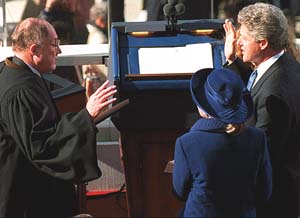The death of Chief Justice William H. Rehnquist marks the second major change to the membership of the Supreme Court and the end of a tremendously successful and dedicated career in public service. “As an associate justice and later the Chief Justice of the United States, William Rehnquist was one of the leading figures in American law for over three decades,” says Neil M. Richards, Ph.D., former law clerk for Chief Justice Rehnquist and associate professor of law at Washington University in St. Louis. “He will be remembered as one of the great Chief Justices in American history, and deservedly so. He was a warm, gentle, funny, conscientious, and brilliant man and judge.”

“Chief Justice Rehnquist has been known for his conservative judicial philosophy, which has influenced the law in such areas as criminal procedure and federalism. But ideology aside and more importantly, Chief Justice Rehnquist presided over the federal courts and the Supreme Court with respect, tact, and good judgment.
“Perhaps more important than his considerable legacy to substantive areas of legal doctrine, or his skillful presiding over President Clinton’s impeachment trial, I believe that the Chief Justice’s tenure will be remembered for the stature and intelligence he brought to the office, in which his reputation and that of the office he held remained high.”

Richards says that it’s important not to lose sight of the fact that the Chief Justice presided over a Court that remained a collegial, functioning, and even friendly place even though it was often deeply divided over substantive legal issues.
“Whether one agrees or disagrees with his opinions, there can be no doubt that the Chief Justice was an able administrator who was able to effectively lead and manage strong personalities on the court through many fractious debates and disagreements,” he says. “He was a leader in the truest sense of the word.”
“As the country debates future nominations to the Court, we would do well to pick people like William H. Rehnquist who, in addition to possessing a fearsome intellect, was able to get along with his colleagues and to make sure that whatever disagreements there were, the Court was able to do its job in a legitimate and decorous way. We have lost a great man. The legal community and country as a whole will miss him.”